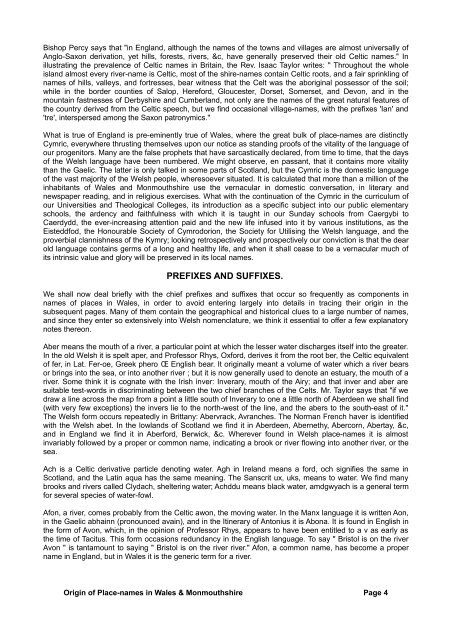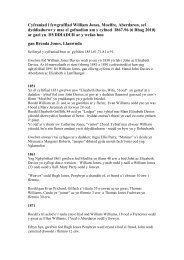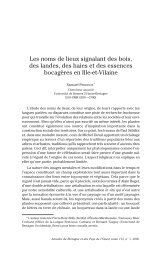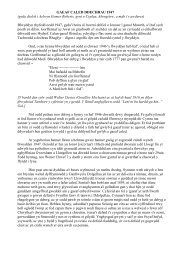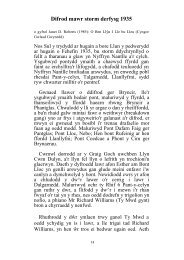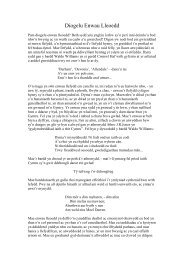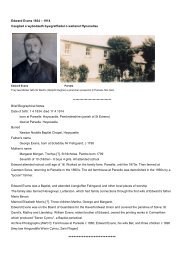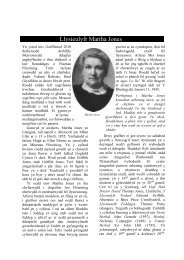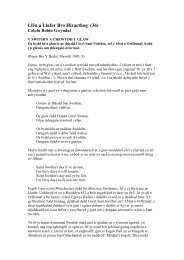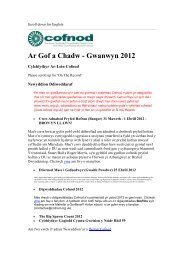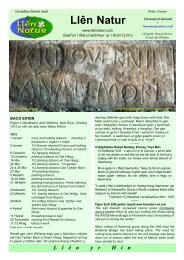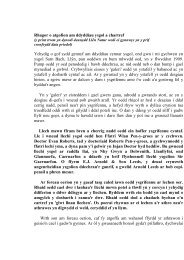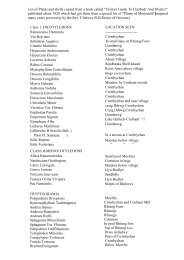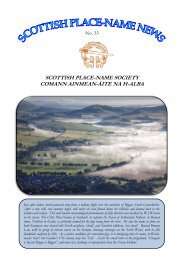handbook of the origin of place-names in wales and monmouthshire
handbook of the origin of place-names in wales and monmouthshire
handbook of the origin of place-names in wales and monmouthshire
- No tags were found...
Create successful ePaper yourself
Turn your PDF publications into a flip-book with our unique Google optimized e-Paper software.
Bishop Percy says that "<strong>in</strong> Engl<strong>and</strong>, although <strong>the</strong> <strong>names</strong> <strong>of</strong> <strong>the</strong> towns <strong>and</strong> villages are almost universally <strong>of</strong>Anglo-Saxon derivation, yet hills, forests, rivers, &c, have generally preserved <strong>the</strong>ir old Celtic <strong>names</strong>." Inillustrat<strong>in</strong>g <strong>the</strong> prevalence <strong>of</strong> Celtic <strong>names</strong> <strong>in</strong> Brita<strong>in</strong>, <strong>the</strong> Rev. Isaac Taylor writes: " Throughout <strong>the</strong> wholeisl<strong>and</strong> almost every river-name is Celtic, most <strong>of</strong> <strong>the</strong> shire-<strong>names</strong> conta<strong>in</strong> Celtic roots, <strong>and</strong> a fair spr<strong>in</strong>kl<strong>in</strong>g <strong>of</strong><strong>names</strong> <strong>of</strong> hills, valleys, <strong>and</strong> fortresses, bear witness that <strong>the</strong> Celt was <strong>the</strong> ab<strong>orig<strong>in</strong></strong>al possessor <strong>of</strong> <strong>the</strong> soil;while <strong>in</strong> <strong>the</strong> border counties <strong>of</strong> Salop, Hereford, Gloucester, Dorset, Somerset, <strong>and</strong> Devon, <strong>and</strong> <strong>in</strong> <strong>the</strong>mounta<strong>in</strong> fastnesses <strong>of</strong> Derbyshire <strong>and</strong> Cumberl<strong>and</strong>, not only are <strong>the</strong> <strong>names</strong> <strong>of</strong> <strong>the</strong> great natural features <strong>of</strong><strong>the</strong> country derived from <strong>the</strong> Celtic speech, but we f<strong>in</strong>d occasional village-<strong>names</strong>, with <strong>the</strong> prefixes 'Ian' <strong>and</strong>'tre', <strong>in</strong>terspersed among <strong>the</strong> Saxon patronymics."What is true <strong>of</strong> Engl<strong>and</strong> is pre-em<strong>in</strong>ently true <strong>of</strong> Wales, where <strong>the</strong> great bulk <strong>of</strong> <strong>place</strong>-<strong>names</strong> are dist<strong>in</strong>ctlyCymric, everywhere thrust<strong>in</strong>g <strong>the</strong>mselves upon our notice as st<strong>and</strong><strong>in</strong>g pro<strong>of</strong>s <strong>of</strong> <strong>the</strong> vitality <strong>of</strong> <strong>the</strong> language <strong>of</strong>our progenitors. Many are <strong>the</strong> false prophets that have sarcastically declared, from time to time, that <strong>the</strong> days<strong>of</strong> <strong>the</strong> Welsh language have been numbered. We might observe, en passant, that it conta<strong>in</strong>s more vitalitythan <strong>the</strong> Gaelic. The latter is only talked <strong>in</strong> some parts <strong>of</strong> Scotl<strong>and</strong>, but <strong>the</strong> Cymric is <strong>the</strong> domestic language<strong>of</strong> <strong>the</strong> vast majority <strong>of</strong> <strong>the</strong> Welsh people, wheresoever situated. It is calculated that more than a million <strong>of</strong> <strong>the</strong><strong>in</strong>habitants <strong>of</strong> Wales <strong>and</strong> Monmouthshire use <strong>the</strong> vernacular <strong>in</strong> domestic conversation, <strong>in</strong> literary <strong>and</strong>newspaper read<strong>in</strong>g, <strong>and</strong> <strong>in</strong> religious exercises. What with <strong>the</strong> cont<strong>in</strong>uation <strong>of</strong> <strong>the</strong> Cymric <strong>in</strong> <strong>the</strong> curriculum <strong>of</strong>our Universities <strong>and</strong> Theological Colleges, its <strong>in</strong>troduction as a specific subject <strong>in</strong>to our public elementaryschools, <strong>the</strong> ardency <strong>and</strong> faithfulness with which it is taught <strong>in</strong> our Sunday schools from Caergybi toCaerdydd, <strong>the</strong> ever-<strong>in</strong>creas<strong>in</strong>g attention paid <strong>and</strong> <strong>the</strong> new life <strong>in</strong>fused <strong>in</strong>to it by various <strong>in</strong>stitutions, as <strong>the</strong>Eisteddfod, <strong>the</strong> Honourable Society <strong>of</strong> Cymrodorion, <strong>the</strong> Society for Utilis<strong>in</strong>g <strong>the</strong> Welsh language, <strong>and</strong> <strong>the</strong>proverbial clannishness <strong>of</strong> <strong>the</strong> Kymry; look<strong>in</strong>g retrospectively <strong>and</strong> prospectively our conviction is that <strong>the</strong> dearold language conta<strong>in</strong>s germs <strong>of</strong> a long <strong>and</strong> healthy life, <strong>and</strong> when it shall cease to be a vernacular much <strong>of</strong>its <strong>in</strong>tr<strong>in</strong>sic value <strong>and</strong> glory will be preserved <strong>in</strong> its local <strong>names</strong>.PREFIXES AND SUFFIXES.We shall now deal briefly with <strong>the</strong> chief prefixes <strong>and</strong> suffixes that occur so frequently as components <strong>in</strong><strong>names</strong> <strong>of</strong> <strong>place</strong>s <strong>in</strong> Wales, <strong>in</strong> order to avoid enter<strong>in</strong>g largely <strong>in</strong>to details <strong>in</strong> trac<strong>in</strong>g <strong>the</strong>ir <strong>orig<strong>in</strong></strong> <strong>in</strong> <strong>the</strong>subsequent pages. Many <strong>of</strong> <strong>the</strong>m conta<strong>in</strong> <strong>the</strong> geographical <strong>and</strong> historical clues to a large number <strong>of</strong> <strong>names</strong>,<strong>and</strong> s<strong>in</strong>ce <strong>the</strong>y enter so extensively <strong>in</strong>to Welsh nomenclature, we th<strong>in</strong>k it essential to <strong>of</strong>fer a few explanatorynotes <strong>the</strong>reon.Aber means <strong>the</strong> mouth <strong>of</strong> a river, a particular po<strong>in</strong>t at which <strong>the</strong> lesser water discharges itself <strong>in</strong>to <strong>the</strong> greater.In <strong>the</strong> old Welsh it is spelt aper, <strong>and</strong> Pr<strong>of</strong>essor Rhys, Oxford, derives it from <strong>the</strong> root ber, <strong>the</strong> Celtic equivalent<strong>of</strong> fer, <strong>in</strong> Lat. Fer-oe, Greek phero ΠEnglish bear. It <strong>orig<strong>in</strong></strong>ally meant a volume <strong>of</strong> water which a river bearsor br<strong>in</strong>gs <strong>in</strong>to <strong>the</strong> sea, or <strong>in</strong>to ano<strong>the</strong>r river ; but it is now generally used to denote an estuary, <strong>the</strong> mouth <strong>of</strong> ariver. Some th<strong>in</strong>k it is cognate with <strong>the</strong> Irish <strong>in</strong>ver: Inverary, mouth <strong>of</strong> <strong>the</strong> Airy; <strong>and</strong> that <strong>in</strong>ver <strong>and</strong> aber aresuitable test-words <strong>in</strong> discrim<strong>in</strong>at<strong>in</strong>g between <strong>the</strong> two chief branches <strong>of</strong> <strong>the</strong> Celts. Mr. Taylor says that "if wedraw a l<strong>in</strong>e across <strong>the</strong> map from a po<strong>in</strong>t a little south <strong>of</strong> Inverary to one a little north <strong>of</strong> Aberdeen we shall f<strong>in</strong>d(with very few exceptions) <strong>the</strong> <strong>in</strong>vers lie to <strong>the</strong> north-west <strong>of</strong> <strong>the</strong> l<strong>in</strong>e, <strong>and</strong> <strong>the</strong> abers to <strong>the</strong> south-east <strong>of</strong> it."The Welsh form occurs repeatedly <strong>in</strong> Brittany: Abervrack, Avranches. The Norman French haver is identifiedwith <strong>the</strong> Welsh abet. In <strong>the</strong> lowl<strong>and</strong>s <strong>of</strong> Scotl<strong>and</strong> we f<strong>in</strong>d it <strong>in</strong> Aberdeen, Abernethy, Abercorn, Abertay, &c,<strong>and</strong> <strong>in</strong> Engl<strong>and</strong> we f<strong>in</strong>d it <strong>in</strong> Aberford, Berwick, &c. Wherever found <strong>in</strong> Welsh <strong>place</strong>-<strong>names</strong> it is almost<strong>in</strong>variably followed by a proper or common name, <strong>in</strong>dicat<strong>in</strong>g a brook or river flow<strong>in</strong>g <strong>in</strong>to ano<strong>the</strong>r river, or <strong>the</strong>sea.Ach is a Celtic derivative particle denot<strong>in</strong>g water. Agh <strong>in</strong> Irel<strong>and</strong> means a ford, och signifies <strong>the</strong> same <strong>in</strong>Scotl<strong>and</strong>, <strong>and</strong> <strong>the</strong> Lat<strong>in</strong> aqua has <strong>the</strong> same mean<strong>in</strong>g. The Sanscrit ux, uks, means to water. We f<strong>in</strong>d manybrooks <strong>and</strong> rivers called Clydach, shelter<strong>in</strong>g water; Achddu means black water, amdgwyach is a general termfor several species <strong>of</strong> water-fowl.Afon, a river, comes probably from <strong>the</strong> Celtic awon, <strong>the</strong> mov<strong>in</strong>g water. In <strong>the</strong> Manx language it is written Aon,<strong>in</strong> <strong>the</strong> Gaelic abha<strong>in</strong>n (pronounced ava<strong>in</strong>), <strong>and</strong> <strong>in</strong> <strong>the</strong> It<strong>in</strong>erary <strong>of</strong> Antonius it is Abona. It is found <strong>in</strong> English <strong>in</strong><strong>the</strong> form <strong>of</strong> Avon, which, <strong>in</strong> <strong>the</strong> op<strong>in</strong>ion <strong>of</strong> Pr<strong>of</strong>essor Rhys, appears to have been entitled to a v as early as<strong>the</strong> time <strong>of</strong> Tacitus. This form occasions redundancy <strong>in</strong> <strong>the</strong> English language. To say " Bristol is on <strong>the</strong> riverAvon " is tantamount to say<strong>in</strong>g " Bristol is on <strong>the</strong> river river." Afon, a common name, has become a propername <strong>in</strong> Engl<strong>and</strong>, but <strong>in</strong> Wales it is <strong>the</strong> generic term for a river.Orig<strong>in</strong> <strong>of</strong> Place-<strong>names</strong> <strong>in</strong> Wales & Monmouthshire Page 4


